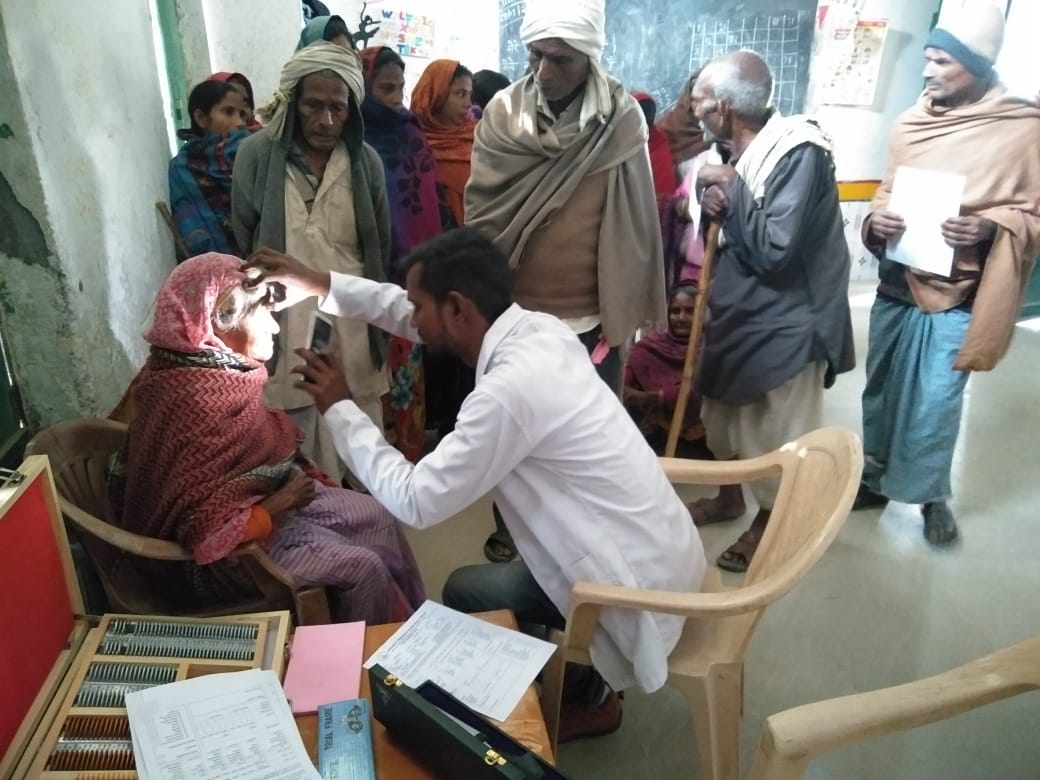
An optometrist at the Prakash Vision Center. Photo by Project Prakash.
Over the past three years, as part of the Mittal Institute’s “Multidisciplinary Approach to Innovative Social Enterprises” program, Project Prakash has focused on treating childhood blindness. Blindness is a significant public health concern but can often be prevented or corrected; while 1.1 billion people globally are affected by some form of vision impairment, 90% of vision loss can be corrected with a pair of spectacles or a simple surgery. Children are often disproportionately impacted by the stigma and consequences of blindness, particularly in countries where they lack access to adequate medical services and educational resources. In India, 90% of blind children are unable to obtain an education, fewer than 50% survive to adulthood and more than 80% are unemployed as adults. Project Prakash aims to provide services for these children, using the model of their Prakash Vision Centers.
Founded in 2005, Project Prakash has developed a three-part approach to treating issues related to blindness with outreach, medical intervention, and scientific research. Composed of primary healthcare workers, optometrists, and ophthalmologists, the Project’s grassroots outreach team travels to hundreds of villages to promote local awareness about treatable and preventable blindness while also conducting screening camps to identify children who can benefit from corrective surgery. While providing pediatric care, the Project additionally promotes research. Medical professionals collect data to illuminate questions about brain plasticity and learning, which not only helps researchers to better understand brain function, but also helps to improve future treatments for patients.
The Project has built and sustained relationships with communities in Northern India, primarily in the densely populated Gangetic plains of Uttar Pradesh, parts of Madhya Pradesh, and Rajasthan. In these communities, the Project serves as a primary source of eye health care, knowledge, and awareness. Field workers use a digitized application to track and follow up with patients. The health data from this centralized repository provides crucial context to formulate policies regarding the types of medical and rehabilitation resources that are most needed to improve children’s health.
During Phase One, the Project Prakash team developed tools for gathering information in a rural field setting. Using these tools, they collected extensive data by surveying over 2000 individuals in some of India’s most impoverished communities. The data revealed a pressing need for primary ophthalmic services and illustrated huge gaps in access to and quality of services related to eye care.
To address the critical needs identified, during Phase Two, the project laid the groundwork for two Prakash Vision Centers (PVCs). With support from Tata Trusts and the Mittal Institute, the project inaugurated these centers in October 2019. PVCs allow Project Prakash to identify candidates for treatment and scientific study on a continuous basis, while also serving as a medical resource for thousands of local people. The PVCs dispense eye screening, counselling and follow-up care while also enabling longitudinal studies and even providing vocational training to the visually impaired.
During Phase Three of the project, teams continued to run the two PVCs. The project established an enduring presence in poorly served rural communities, and focused on identifying avenues for financial sustainability. Studies worked towards understanding of the nature and magnitude of eye care needs in rural settings with the goal of developing a sustainable supply-chain model that would allow for ongoing record-keeping and monitoring by the Prakash team in New Delhi.
At the end of the past three years, the project concludes its Tata Trusts grant with several major achievements. Project Prakash has been successful in improving public health outcomes by restoring eyesight to large sections of India’s population that would otherwise not have access to optometric products and services. In keeping with its goal of research collection and generation, the data collected as part of the Phase Two surveys and in the vision centers on an ongoing basis will provide a comprehensive picture of eye health across many sites in India.
During COVID-19, the team disseminated related information and continued to build awareness, educating the residents about prevention measures, distributing supplies such as sanitizers and masks, and conducting thermal screenings to identify positive cases in these areas. The services at PVCs have now resumed, with requisite safety protocols in place. The team is also in the process of creating a constellation of state and non-state actors to facilitate the sharing of resources between healthcare providers.
At the end of the past three years, the project concludes its Tata Trusts grant with several major achievements. Project Prakash has been successful in improving public health outcomes by restoring eyesight to large sections of India’s population that would otherwise not have access to optometric products and services. In keeping with its goal of research collection and generation, the data collected as part of the Phase Two surveys and in the vision centers on an ongoing basis will provide a comprehensive picture of eye health across many sites in India.
Lastly, the data collected by Project Prakash have already begun changing practices previously adopted by ophthalmologists. Some of these groundbreaking studies have forced a reconsideration of the notion that children with congenital blindness beyond a certain age would not benefit from surgery. Instead, studies demonstrated that the human brain retains significant plasticity, and children retain a tremendous scope for improvement in functional vision.
